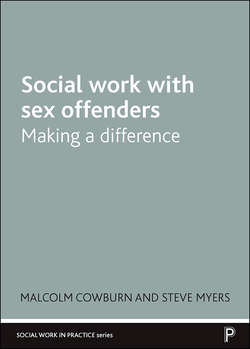Читать книгу Social Work with Sex Offenders - Cowburn Malcolm - Страница 10
На сайте Литреса книга снята с продажи.
Naming the person committing sexual harm
ОглавлениеThe use of the phrase ‘sexual offences’ needs qualification, as does the term ‘sex offender’. Offences are acts that are both defined and proscribed by law. Legal definitions of (sex) crimes embody the values of dominant groups in particular societies at specific times. Behaviours defined in law as sexual offences vary significantly across time and culture. However, legally defining sexual offences does not guarantee that a person will feel able to report the sexual harm they have experienced. A study by Percy and Mayhew (1997), using a number of international victim self-report surveys, estimated that there are 15 times more unreported sex offenders than reported ones; in 2011, Rape Crisis South London (2011) suggested that only 11% of women who are victims of serious sexual assault report the crime. Therefore, under-reporting remains a constant problem.
However, once an offence has been reported, the vast majority of reports do not result in anyone being convicted of an offence. Court processes differ across countries, but attrition is an international phenomenon. Approximately 10% of cases reported to the police result in a criminal conviction (for further details, see Figure 2.2, p 37). Thus, to write or speak of ‘sex offenders’, with the implication that these people are defined by a criminal conviction, is problematic insofar as this excludes many people who may have harmed others but not been convicted.
Conversely, some innocent people may be convicted of sexual offences (see Locke, 2013; Falselyaccused.co.uk, 2015). This is a very difficult area because social workers may be required to engage with people on the basis of their conviction and a person who maintains his/her innocence will be unable to engage in any formal risk assessment process because this requires her/him to reflect on their offending behaviour. While issues related to this group of people are not centrally considered in this book, we suggest that social workers should advise ‘offenders’ who maintain their innocence to seek legal representation in order to challenge their conviction.
The aforementioned complexities pose challenges for the sensitive, but economic, use of language in this book. A person who contravenes the law relating to sexual offences is a ‘sex offender’, so named because they have been convicted of the offence in a criminal court. However, many people sexually harm others without their actions being reported and the offender being convicted; in such cases, the harmful person is known as the ‘perpetrator’. Social workers work with both offenders and perpetrators. In some cases, a person accused of a sexual offence may be innocent and yet be convicted; unless the conviction is overturned by a court, this person remains (technically) an ‘offender’. The word ‘offender’ is, however, problematic for (at least) two reasons: it dehumanises the person referred to and it describes her/him solely in terms of their past actions. Yet, completely avoiding the use of the word ‘offender’ in this book is stylistically problematic. We use the term consciously, recognising its shortcomings. Throughout the book, we also use other phrases, as we have done in this introduction, to dilute the impact of the ‘offender’ word.
